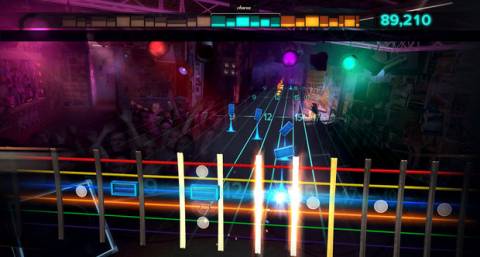I did not go into Ubisoft's New York City press day expecting to write anything about Rocksmith, the publisher's debut foray into the realm of non-dancing music games. Given my previous, erm, history with the genre, my intuition was to just avoid the room that housed the title as if it contained a stack of expired plague victims.

My fear was objectivity. I like lots of music games, and I play lots of music games. That said, my earlier industry associations make it difficult to sound objective when talking about products that competed with my previous employer (Harmonix Music Systems, makers of the Rock Band series), especially when discussing a negative impression. Going into a Rocksmith demo, I had a great deal of skepticism regarding the product. Rock Band 3 was the first title to attempt a real guitar game with its pro instrument mode, and the marketing coming out of Ubisoft proclaiming it to be the first "real" guitar experience on consoles seemed like petty grandstanding. Infomercial-type videos like this did little to help matters, and then there's that name...the whole thing was setting off the same alarms that Power Gig did upon its debut.
And yet, I somehow found myself pulled into Rocksmith's orbit. Suddenly, a guitar was strapped to my waist, and I was at the mercy of Ubisoft San Francisco creative director Paul Cross, who slowly but surely began to show me the ropes when it comes to Rocksmith's brand of guitar instruction. After what felt like at least an hour of discussion, observing others play, and playing myself, I can say with definition that this is not Power Gig all over again.
In fact, it's actually pretty cool.
The premise of the game sounds like pure voodoo. A small USB-to-quarter-inch adapter bridges the gap between any electric guitar you may already own (Cross very much stressed that any guitar brand should work) and your home console of choice. When you strum a note on your guitar, the note plays through your television's speakers with any effects, distortion, or whatever else you program using the in-game pedals system.
The crazy thing is that it works. I do not play guitar. I have spent ample time futzing around with Rock Band 3's pro guitar mechanics, and through that I picked up a few things, but eventually I was forced to resign myself to the notion that I am a drummer, and not a guitar player. Ultimately, I may end up having the same reaction to Rocksmith in the long-run, but the early modes I played not only worked, but they gave me hope that I might not be completely worthless at playing a guitar.
A big part of Rocksmith's methodology revolves around its difficulty settings, or lack thereof. There is no expert mode in Rocksmith, nor is there an easy mode. Rather, difficulty revolves around "leveling up" songs. You can choose to play any available song in arrangements of single notes, chords, or full charts, and when you begin playing, you're dealt a minimalist version of that arrangement's note chart. The game reacts to how you play, slowly building up the number of notes it tosses at you based on your performance. Once you level up a song, you can keep practicing it until you eventually are playing the entire thing note-for-note. It's worth noting that if you're already an expert guitar player and know the song in question, the game doesn't penalize you for playing extra notes on an easier chart. As long as you're hitting the correct notes it tosses at you, you can play pretty much whatever you want in between.

Weird as that may sound to those who have spent years playing Rock Band and Guitar Hero, it's actually perfectly workable in practice. Largely, that's because there are no dead spots in the music when you mess up. Cross told me that while the team had played around with chopping up the masters and adding failure-oriented sound effects for missed notes, playtesters ultimately found it too distracting. So much as you would in a guitar lesson, you simply play over the song in its entirety. The volume differential between your guitar and the song seemed such that it shouldn't be too distracting to play over the existing track.
Rocksmith's interface does a great deal to engender feelings of ease when picking it up for the first time. In videos, the mirrored image of strings and frets to what your hand actually is required to rest upon looks a little odd, but in practice, it works extremely well. Once you start a song, you're required to strum each string individually to make sure they're in tune (a tuning prompt appears if they aren't), and once the song begins, notes move toward the represented fret bar on the screen, with colors and numbers depicting which string to strum, and which string to hit, respectively.
My first attempt to play was on The Rolling Stones' "Satisfaction," which has a fairly iconic opening salvo of notes. Early struggles audibly signaled that I had no idea what I was doing, but after a couple of reboots, I hit that first signature note, and from there, I began to improve. The timing window for the notes seems reasonable, as I am not perfect at strumming in time, and I still hit most of the notes that I had locked to the correct fret.
Unfortunately, a bug in the build I saw prevented Cross from showing me some of the more complicated, leveled-up note charts, but I could see a bit of progression as I got better, and as Cross (who himself was not a guitar player when the project first began, but began to learn alongside the development of the game) played on songs he'd spent some time leveling up manually. I do look forward to seeing someone play along with a fully-leveled up version of Cream's "Sunshine of Your Love." That ought to be a sight.
Speaking of the soundtrack, the build I saw at Ubisoft's event actually had a few more songs than the nearly 30 that have thus far been announced. While I can't spoil what I've seen beyond those announced songs (which include everything from Bowie to Black Keys and back again), I can say that the soundtrack reminds me a lot of the first Guitar Hero soundtrack--with master tracks instead of covers, of course. It's geared less toward the notion of a radio-friendly playlist of non-stop hits, and more toward finding songs that simply play great on the guitar. The developers are looking for riffs, solos, and iconic guitar lines that are going to be fun to play. While there are undoubtedly some classics, there are as many smaller indie rock bands, including a few bonus tracks from projects headed up by developers at the studio. Unsurprisingly, those are some of the more challenging tracks in the game.
DLC will, unsurprisingly, be added to Rocksmith post-release, but Cross and other Ubisoft representatives were mum on what kind of songs might be coming down the pipes, as well as how frequently they'd be coming. You can likely expect at least monthly offerings to start, though how frequently they come beyond the early release days will simply depend on how well the game performs.
I went into Rocksmith expecting nothing, and came out of my demo shocked at how wrong those expectations were. It's easy to get cynical in this business, especially after hearing ad infinitum how thoroughly dead music games are, and seeing the blitzkrieg of cringe-worthy marketing Ubisoft has thus far inundated consumers with. That Rocksmith was able to penetrate that initial skepticism and show me something legitimately cool is a testament to what Ubisoft is aiming to do with this game.
Is Rocksmith absolutely, 100% guaranteed to make you into an expert guitar player? I have absolutely no idea. You'll probably have to wait for the reviews to start hitting to find that out. Will Rocksmith help revitalize the flailing music genre? Again, it's too early to tell, but to hear Cross tell it, he hopes Rocksmith will simply help push innovation in music titles, much the way Rock Band did with its last iteration, and inspire competition in the genre once more. Is Rocksmith a fun way for newcomers to test the waters of learning the guitar? From my time playing it, I certainly think so.